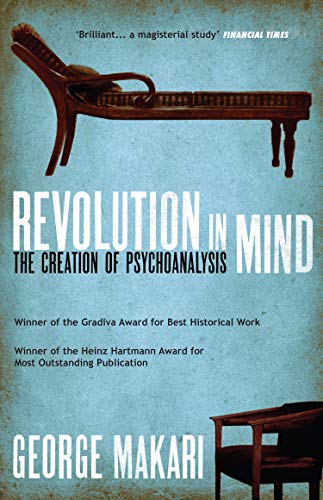Items related to Revolution in Mind: The Creation of Psychoanalysis

Synopsis
How did Freudian Theory come together as a body of ideas, and how did these ideas attract followers who spread this model of mind throughout the West? Makari contextualises Freud's early psychological work amid the great changes occurring in late-nineteenth-century European science, philosophy, and medicine, showing how Freud was a creative, inter-disciplinary synthesizer whose immersion in pre-existing domains of study led to the creation of Freudian Theory. He looks at how Freud's followers built a heterogeneous movement in the years leading to 1914, at the growth of the movement, and its subsequent collapse with the departures of Bleuler, Jung and Adler. Finally, Makari examines the critical, but neglected, Weimar period, when there was an attempt to rebuild a more pluralistic psychoanalytic community. This reformation resulted in the broader theoretical reach of psychoanalysis and its greater acceptance across the Western world outside Europe, where the rise of fascism was to lead to the destruction of psychoanalysis and the culture that once sustained it.
"synopsis" may belong to another edition of this title.
About the Author
George Makari M.D. is Director of Cornell's Institute for the History of Psychiatry, Associate Professor of Psychiatry at Weill Medical College, and Visiting Associate Professor at Rockefeller University.
"About this title" may belong to another edition of this title.
£ 2.80 shipping within United Kingdom
Destination, rates & speedsSearch results for Revolution in Mind: The Creation of Psychoanalysis
Revolution in Mind: The Creation of Psychoanalysis
Seller: WorldofBooks, Goring-By-Sea, WS, United Kingdom
Paperback. Condition: Very Good. The book has been read, but is in excellent condition. Pages are intact and not marred by notes or highlighting. The spine remains undamaged. Seller Inventory # GOR003334857
Quantity: 4 available
Revolution in Mind: The Creation of Psychoanalysis
Seller: Bill & Ben Books, Faringdon, United Kingdom
Paperback. Condition: New. Answers two fundamental questions: How did Freudian theory come together as a body of ideas, and how did these ideas attract followers who spread this model of the mind throughout the West? This book contextualises Freud's early psychological work amid the changes occurring in late-19th century European science, philosophy, and medicine. Seller Inventory # 0103833
Quantity: Over 20 available
Revolution in Mind The Creation of Psychoanalysis
Seller: PBShop.store UK, Fairford, GLOS, United Kingdom
PAP. Condition: New. New Book. Shipped from UK. Established seller since 2000. Seller Inventory # FV-9780715639627
Quantity: 15 available
Revolution in Mind
Seller: Ria Christie Collections, Uxbridge, United Kingdom
Condition: New. In English. Seller Inventory # ria9780715639627_new
Quantity: 10 available
Revolution in Mind: The Creation of Psychoanalysis
Seller: THE SAINT BOOKSTORE, Southport, United Kingdom
Paperback / softback. Condition: New. This item is printed on demand. New copy - Usually dispatched within 5-9 working days 550. Seller Inventory # C9780715639627
Quantity: 10 available
Revolution in Mind (Paperback)
Seller: CitiRetail, Stevenage, United Kingdom
Paperback. Condition: new. Paperback. How did Freudian Theory come together as a body of ideas, and how did these ideas attract followers who spread this model of mind throughout the West? Makari contextualises Freud's early psychological work amid the great changes occurring in late-nineteenth-century European science, philosophy, and medicine, showing how Freud was a creative, inter-disciplinary synthesizer whose immersion in pre-existing domains of study led to the creation of Freudian Theory. He looks at how Freud's followers built a heterogeneous movement in the years leading to 1914, at the growth of the movement, and its subsequent collapse with the departures of Bleuler, Jung and Adler. Finally, Makari examines the critical, but neglected, Weimar period, when there was an attempt to rebuild a more pluralistic psychoanalytic community. This reformation resulted in the broader theoretical reach of psychoanalysis and its greater acceptance across the Western world outside Europe, where the rise of fascism was to lead to the destruction of psychoanalysis and the culture that once sustained it. Based on new archival materials and a decade of research, Revolution in Mind is a radically new history of psychoanalysis. It tells the story of the birth, development, and death of psychoanalysis in Europe between 1870 and 1945, integrating these chapters into a coherent narrative for the first time. Shipping may be from our UK warehouse or from our Australian or US warehouses, depending on stock availability. Seller Inventory # 9780715639627
Quantity: 1 available
Revolution in Mind
Seller: Majestic Books, Hounslow, United Kingdom
Condition: New. pp. 624 Illus. Seller Inventory # 3268060
Quantity: 3 available
Revolution in Mind
Seller: Kennys Bookshop and Art Galleries Ltd., Galway, GY, Ireland
Condition: New. 2010. Paperback. Based on new archival materials and a decade of research, Revolution in Mind is a radically new history of psychoanalysis. It tells the story of the birth, development, and death of psychoanalysis in Europe between 1870 and 1945, integrating these chapters into a coherent narrative for the first time. Num Pages: 624 pages. BIC Classification: 1D; 3JH; 3JJC; 3JJF; 3JJG; 3JJH; JMAF; PDX. Category: (UP) Postgraduate, Research & Scholarly. Dimension: 196 x 134 x 43. Weight in Grams: 412. . . . . . Seller Inventory # V9780715639627
Quantity: Over 20 available
REVOLUTION IN MIND
Seller: Revaluation Books, Exeter, United Kingdom
Paperback. Condition: Brand New. 7.72x5.08x1.50 inches. In Stock. Seller Inventory # __0715639625
Quantity: 1 available
Revolution in Mind
Seller: Kennys Bookstore, Olney, MD, U.S.A.
Condition: New. 2010. Paperback. Based on new archival materials and a decade of research, Revolution in Mind is a radically new history of psychoanalysis. It tells the story of the birth, development, and death of psychoanalysis in Europe between 1870 and 1945, integrating these chapters into a coherent narrative for the first time. Num Pages: 624 pages. BIC Classification: 1D; 3JH; 3JJC; 3JJF; 3JJG; 3JJH; JMAF; PDX. Category: (UP) Postgraduate, Research & Scholarly. Dimension: 196 x 134 x 43. Weight in Grams: 412. . . . . . Books ship from the US and Ireland. Seller Inventory # V9780715639627
Quantity: Over 20 available

